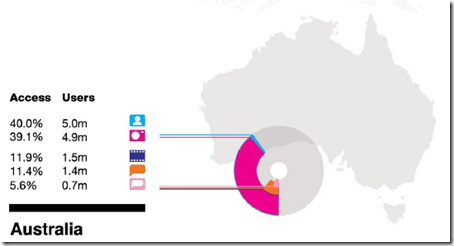Darth History
Did you know Darth Vader attended the Yalta conference at the end of World War Two?
History makes such good raw material for the Photoshop-inclined. See the full set of wonderfully mashed up Superheroes in History from agan harahap. [Via io9]
Digital Culture Links: December 18th 2009
Links for December 16th 2009 through December 18th 2009:
- Privacy groups challenge Facebook on new settings [BBC News] – “Ten privacy groups in the US have filed a complaint to the Federal Trade Commission over Facebook’s new privacy settings. They argue that privacy on the social networking site has been adversely affected as the firm encourages users to open up their profiles. The company changed its privacy settings, ostensibly to make it easier for users to control their profiles. But it also made it easier for content to be shared with all Facebook users. The idea that personal photos and comments can be seen by all 350 million Facebook users has angered privacy groups. The complaint, filed by the Electronic Privacy Information Center and signed by nine other privacy groups, argues that the recent changes “adversely impact users”. Facebook’s changes to users’ privacy settings disclose personal information to the public that was previously restricted,” the complaint read. “
- Microsoft admits code theft for Chinese blog Juku [BBC News] – “Microsoft has indefinitely suspended its Chinese microblogging service MSN Juku after admitting that it “copied” code used to create the site. A vendor contracted to work for the software giant was caught lifting code from a rival Canadian start-up, Plurk. According to Plurk as much as 80% of the basecode was “stolen directly”. Microsoft apologised to Plurk, saying “we are obviously very disappointed but we assume responsibility for this situation”.”
- Child groups slam Conroy’s ISP filtering plans – internet content filtering, mandatory internet fitering, National Children’s and Youth Law Centre (NCYLC), Save the Children [Computerworld] – Children’s rights groups have spoken out against the Federal Government’s plans to introduce mandatory ISP-level filtering, saying it will not effectively protect children. International child rights group, Save the Children, said while it congratulates the government on its attempt to improve the safety of children online, an ISP-level filter is not the best way to offer protection. Child rights specialist, and organisation spokesperson, Dr Annie Pettitt, said it would be more appropriate for the government to educate children and families about appropriate and safe Internet use. “The filter could lull parents into a false sense of security thinking that it is working, but we know hackers are always ahead of those filtering technologies,” Pettitt said. “We could be left in a situation where we think that the filter is sorting out stuff, when in fact it’s not.””
Australian Internet Censorship: No Thanks.

Earlier today I was interviewed by Damien Smith on RTR FM’s morning magazine talking about the Australian Federal Government’s plan to introduce national internet censorship. As you might imagine, I’m not a fan of the plan, and think its the thin edge of a very large, potentially very conservative and encompassing censorship programme. Feel free to listen to the interview, or grab the direct mp3 download, but more than that, please take a look at this material and judge the plan for yourself:
- The Official Report on the ISP Filtering Trial in Australia by Enex
- Net censorship trial report brings more questions than answers by EFA
- Google Australia’s Response to the Internet Filter Plans
- An open letter to Stephen Conroy by Eric Pinkerton
- Welcome to National Censorship Day by David Braue
If you think this is a poor plan for Australia, please let your voice be heard.
Australia’s Compulsory Internet Censorship
Kevin Rudd’s Australian government: maybe one step forward; definitely fifty steps backward.
Global Map of Social Web
Trendstream have released a really interesting comparative Global Map of Social Media use; China emerges as the biggest user in number terms (but that’s always relatively to population), but Australia’s not looking too shy, either:
Digital Culture Links: December 10th 2009
Links for December 6th 2009 through December 10th 2009:
- Tiger Woods’s Web Site Is Drawing Attention and Scrutiny [NYTimes.com] – When Web Presence goes wrong: “In the nearly two weeks since Tiger Woods became tabloid fodder, his personal Web site has turned into a kind of town hall meeting on his reported extramarital behavior. More than 22,000 comments, many of them supportive but plenty of the finger-wagging variety, followed the Dec. 2 statement in which he admitted to vague “transgressions” and to letting his family down. The scandal over Woods’s suspected misdeeds has elevated TigerWoods.com’s traffic drastically, although not into the Internet stratosphere. In the week ending Nov. 29 — the day he issued his statement about his car accident — the number of unique users soared to 488,000 visitors, according to Nielsen Online. In that same period, it beat the 89,000 who visited BritneySpears.com.”
- Facebook’s New Privacy Changes: The Good, The Bad, and The Ugly [Electronic Frontier Foundation] – “Although sold as a “privacy” revamp, Facebook’s new changes are obviously intended to get people to open up even more of their Facebook data to the public. The privacy “wizard” that guides users through the configuration will “recommend” — preselect by default — the setting to share the content they post to Facebook, such as status messages and wall posts, with everyone on the Internet, even though the default privacy level that those users had accepted previously was limited to “Your Networks and Friends” on Facebook […] to ensure that users don’t accidentally share more than they intend to, we do not recommend Facebook’s “recommended” settings.” (Facebook’s explanation of the new settings.)
- Game Developer Won’t Edit ‘Aliens vs. Predator’ To Appease Australian Censors [Techdirt] – “Rose M. Welch alerts us to the news that game developer Rebellion has decided not to resubmit an edited version of its game Aliens vs. Predator after it was rejected by the Australian Classification Board for being too violent. The company stated that it agrees the game is not suitable for children: “We agree strongly that our game is not suitable for game players who are not adults… it is bloody and frightening, that was our intent.” But Australia apparently doesn’t have an option for such “mature” content, and Rebellion seems to recognize how ridiculous that is: “We will not be releasing a sanitized or cut down version for territories where adults are not considered by their governments to be able to make their own entertainment choices.” Hopefully, things like this will make Australia reconsider its censorship of such content.” (Oh, Australia is ready to reconsider our insane games rating system … some annoying guy in SA isn’t!)
- More than 50 papers join in front-page leader article on climate change [Media | guardian.co.uk] – THE GOOD: “The Guardian has teamed up with more 50 papers worldwide to run the same front-page leader article calling for action at the climate summit in Copenhagen, which begins tomorrow. This unprecedented project is the result of months of negotiations between the papers to agree on a final text, in a process that mirrors the kind of diplomatic wrangling among the world’s governments that is likely to precede any potential deal on climate change. Fifty-six papers in 45 countries published in 20 different languages have joined the initiative, and will feature the leader in some form on their front pages.
THE BAD: “Two Australian papers, the Age and the Sydney Morning Herald, pulled out at a late stage after the election of climate change sceptic Tony Abbott as leader of the opposition Liberal party recast the country’s debate on green issues.” (Australian media already bowing to Tony Abbott’s climate change scepticism …) - App Store Is a Game Changer for Apple and Cellphone Industry [NYTimes.com] – “Apple changed the view of what you can do with that small phone in your back pocket,” says Katy Huberty, a Morgan Stanley analyst. “Applications make the smartphone trend a revolutionary trend — one we haven’t seen in consumer technology for many years.” Ms. Huberty likens the advent of the App Store and the iPhone to AOL’s pioneering role in driving broad-based consumer adoption of the Internet in the 1990s. She also draws comparisons to ways in which laptops have upended industry assumptions about consumer preferences and desktop computing. But, she notes, something even more profound may now be afoot. “The iPhone is something different. It’s changing our behavior,” she says. “The game that Apple is playing is to become the Microsoft of the smartphone market.” (That last sentence is the important one: Microsoft has trouble playing with others; Apple’s increasingly having that issue, too!)
A Day in the Internet
Some useful comparisons for teaching about teh Interwebs …

Created by OnlineEducation.net [Via Jill]
Google gets real-time, but is real actually good?
In yesterday’s massive Google product roll-out, the big drawcard was the release of real-time search into their standard search results. Real-time search initially includes Twitter tweets, but will soon include Facebook status updates (from public profiles) and MySpace statuses, too. As The Guardian quite rightly notes, the release of real-time search quashes talk about Twitter or Facebook becoming major challengers to Google’s search dominance:
Some critics have posited that websites like Facebook and Twitter could eventually rival Google, thanks to their ability to tap into millions of public messages being sent constantly between individuals. That threat comes in addition to more traditional search engines like Microsoft‘s Bing.com have threatened to forge exclusive deals with some content providers as a way to claw back market share. Instead, Google has acted to bring those services into the fold, though it would neither confirm nor deny whether there was a financial relationship behinds its links with social networking sites.
Indeed, in the New York Times, Twitter co-founder Biz Stone suggests that the relationship between Twitter and Google is an ideal partnership, with Google’s advanced search technologies making Twitter searching more meaningful to users:
Twitter makes a search tool available on its own site. But Biz Stone, a Twitter co-founder, said that Google would be better able to serve up Tweets that are relevant to a particular user’s questions. “Were not good at relevancy right now, and they are,” he said. “More people will get more value out of Twitter because we are doing this with Google.”
Real-time search will appear in a live-updating box at the top of relevant search results; here’s Google’s real-time search video to explain:
Real-time search is being rolled out across the globe in the coming days, but to see it in action now, head over to Google Trends and click on any of the popular searches; the results will include real-time search results.
Of course, it’s worth mentioning that just because social media statuses and tweets are being generated in ‘real-time’ it doesn’t necessarily make them worth reading. On any given topic, the speed with which Twitter fills up with spam tweets is pretty rapid, so this is a whole new spam arena, with the real prize being the top spots on Google’s most valuable real-estate: the main search pages. More to the point, while other results are ranked in various ways, real-time just means it’s happening now, which is no indication of quality whatsoever. Real-time is a whole new game in some ways, and it’ll be interesting to see what happens. Naturally, for people who still haven’t thought through their privacy in terms of Twitter or Facebook should really think about it now; do you want your status updates appearing at the top of Google’s search results? A question especially important when Google’s CEO is happy to state on the record: “If you have something that you don’t want anyone to know, maybe you shouldn’t be doing it in the first place.”
Oh, and in another Google product launch which got a lot less attention, Google’s mobile phone OS, android, now has a really promising image recognition app: Google Goggles; just take a picture and let Google Goggles figure out what it is, and take you to an appropriate reference! Goggles don’t do facial recognition, yet, but there’s a future worth thinking through, too!
Digital Culture Links: December 6th 2009
Links for December 3rd 2009 through December 6th 2009:
- Panic Attack and YouTube Discovery [The Chutry Experiment] – Great post from Chuck Tryon about Fede Alvarez’s sudden appearance on the Hollywood radar thanks to his YouTube short “Ataque de Pánico,” (Panic Attack!), 4 minute special effects driven extravagnaza in which a city is destroyed and a career created: “One of the underlying narratives associated with Hollywood mythology is the “discovery story,” the idea that a talented newcomer emerges by chance, out of nowhere, to become a Hollywood “star.” Lana Turner was discovered, so the legend goes, on a barstool at Schwab’s drugstore. Now, as the tools of filmmaking and film distribution have been democratized, those discovery stories have expanded to filmmakers as well. And although it is the case that such stories can be read ideologically, it is also true that YouTube and other video sharing sites still offer us the opportunity to be astonished by the talents of an aspiring filmmaker.”
- Memories of a paywall pioneer | Media | guardian.co.uk – Scott Rosenberg reflects on Salon’s experiments with a paywall, suggesting it’s not the model for future news media: “I’m not hostile to the notion of people paying for online content. I do so myself. I’m glad people stepped up and paid for Salon. But the value of stuff online is usually tied to how deeply it is woven into the network. So locking your stuff away in order to charge for it means that you are usually making it less valuable at the moment that you are asking people to pay for it. And that’s why people so often respond with: “No thanks.””
- Vampire Politics by Lisa Nakamura et al [Flow TV, 11.03, 2009] – “True Blood is socially conservative, gesturing towards a radical politics (or any social movement based politics) that it cannot (or will not) deliver. Likewise, the form of the medium itself is conservative. Like its vampires, True Blood is a relic – it airs on television, not the Internet, and it is broadcast rather than streamed. Though HBO claims “it’s not television, it’s HBO,” we know better. Like the credit sequence’s time-delayed decayed foxes and possums, True Blood is a memento mori – to the Civil Rights South, to broadcast television, to civil rights organizing and “unsexy” rights-based movements. True Blood pursues vampire politics, which are all about sexy self fashioning. Were it not for the exquisite Godric’s self-immolation in season two, the program’s credo might be “survival of the sexiest.””
- Networking Families: Battlestar Galactica and the Values of Quality by Jordan Lavender-Smith [Flow TV, 11.03, 2009] – “Galactica’s interrogation of post-nuclear family mechanics and what it means to be human was potentially groundbreaking, but by the show’s end the reconstitution of the family breaks down, and a thick line is drawn between the natural and artificial, delivering an outmoded humanism through posthuman technologies.”
- Identity Wars: Google & Yahoo! Bow to Facebook & Twitter [RW Web] – “Yahoo! announced this morning that it is adding Facebook Connect across many of its properties. This afternoon Google Friend Connect announced the inclusion of Twitter as a top-level log-in option. These moves will be convenient for users, but may not be good for the future of the web.” (This is a really interesting article looking at what happens when Facebook and Twitter become default identity authentication systems – so much power then resides in these systems, and what happens to attempts at standards like OpenID?)




